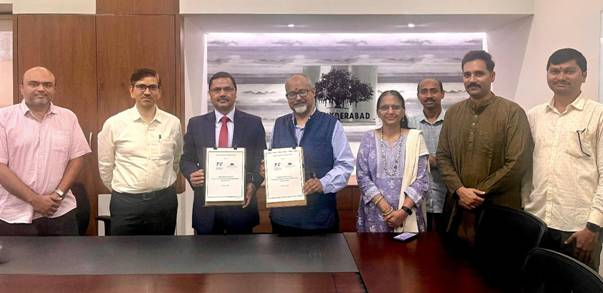TEC, IIIT-Hyderabad Partner to Drive Indigenous R&D in Next-Gen Telecom
The collaboration aims to develop India-specific standards, promote cutting-edge telecom R&D, and strengthen the country’s role in global standardization forums.

- Country:
- India
In a strategic move to bolster India's leadership in next-generation telecommunications and digital infrastructure, the Telecommunication Engineering Centre (TEC) — the technical arm of the Department of Telecommunications (DoT), Government of India — has signed a Memorandum of Understanding (MoU) with the International Institute of Information Technology, Hyderabad (IIIT-Hyderabad). The collaboration aims to develop India-specific standards, promote cutting-edge telecom R&D, and strengthen the country's role in global standardization forums.
The MoU was formally signed on October 24, 2025, at IIIT-Hyderabad by Shri Amit Kumar Srivastava, Deputy Director General (Mobile Technologies), TEC, and Prof. Sandeep Shukla, Director, IIIT-Hyderabad. The event was graced by Shri Syed Tausif Abbas, Senior DDG and Head (TEC), alongside senior faculty members and researchers from the institute.
Strategic Framework for Innovation and Standardisation
This collaboration establishes a robust framework for joint technical studies, academic-industry cooperation, and collaborative research in emerging technologies. It will enable TEC and IIIT-Hyderabad to co-develop future-ready standards, build test frameworks, and contribute significantly to international standardization platforms like the International Telecommunication Union – Telecommunication Standardization Sector (ITU-T) and the 3rd Generation Partnership Project (3GPP).
The MoU is a crucial milestone in aligning India's telecom ecosystem with global technology shifts while reinforcing the Atmanirbhar Bharat vision through indigenous design, research, and development.
Key Areas of Joint Collaboration
The partnership outlines several critical domains for collaborative research and innovation:
1. AI-Driven Telecom Networks
The two institutions will co-develop Artificial Intelligence (AI)-based telecom applications, focusing on intelligent network management, automation, and predictive maintenance. This will contribute towards realizing AI-native telecom architectures, especially in the context of 6G and beyond. The research will also explore machine learning models for spectrum allocation, anomaly detection, and self-healing networks.
2. mmWave and Cognitive Radio Technologies
With the evolution towards 5G Advanced and 6G, the collaboration will focus on millimeter wave (mmWave) communications, advanced beamforming techniques, and cognitive radio systems that enable dynamic spectrum utilization. This is particularly relevant for urban dense environments, defense communication, and high-speed mobile broadband.
3. Smart Cities and IoT
Joint technical studies will be conducted on the use of Internet of Things (IoT), oneM2M standards, digital twins, and edge computing in the context of Smart City deployments. IIIT-Hyderabad's deep research in urban analytics and TEC's policy mandate will create practical models for urban governance, infrastructure management, and citizen-centric services.
4. Quantum Communications
Recognizing the potential of quantum technologies in securing future communications, the MoU includes collaboration in quantum key distribution (QKD), quantum-safe protocols, and the development of test beds for quantum communication systems. These efforts align with India's National Mission on Quantum Technologies and Applications.
5. Cyber Security in Telecom
Cyber resilience is a foundational component of telecom infrastructure. The institutions will jointly work on cyber threat modelling, network intrusion detection, telecom-specific security protocols, and secure firmware/software development life cycles (SDLC). This is especially critical with increasing deployment of IoT and 5G equipment in critical sectors.
Accelerating India's Role in Global Standardisation
India's participation in global telecom standardization bodies like ITU, 3GPP, and IEEE has grown in recent years. The TEC–IIIT-Hyderabad partnership is expected to sharpen India's voice in these platforms by submitting original research, India-centric use cases, and technical contributions that reflect the country's unique needs and infrastructure scenarios.
"This MoU is a step forward in positioning India as a global hub for telecom innovation. It will lead to the creation of indigenous telecom products and systems designed for India, by India," said Shri Amit Kumar Srivastava.
Supporting Atmanirbhar Bharat and National Digital Sovereignty
Aligned with the Atmanirbhar Bharat Abhiyan, the initiative will reduce India's reliance on imported telecom equipment by nurturing home-grown solutions, standards, and IP assets. Indigenous development also supports strategic autonomy, national security, and resilient digital infrastructure, especially as telecom forms the backbone of Digital India.
Moreover, by tapping into IIIT-Hyderabad's academic strengths and TEC's regulatory and technical expertise, the collaboration will create opportunities for capacity building, skilling, and knowledge transfer for India's future telecom workforce.
Looking Ahead
This MoU marks the beginning of a long-term partnership aimed at delivering tangible outcomes such as:
-
White papers and technical contributions to ITU and 3GPP
-
Development of standard reference architectures and test beds
-
Support for Indian start-ups and MSMEs through standards-based innovation
-
Training programs for government and industry stakeholders
-
Development of a national repository of telecom standards and test cases
The agreement reinforces India's ambition to not just be a consumer of telecom technologies, but a global leader in telecom innovation and standard-setting.
ALSO READ
-
India Launches MAHA-MedTech Mission to Boost Indigenous Medical Innovation
-
Rahul Gandhi can not protect infiltrators by taking out 'Ghuspetiya Bachao Yatra', claims Amit Shah at Khagaria poll rally.
-
UN Expert Warns of Global Threat to Online Free Expression from States and Big Tech
-
UN Calls for Stronger Protections of Religious Freedom for People on the Move
-
Epack Prefab Technologies: Building Success with Rs 130 Crore Contract





